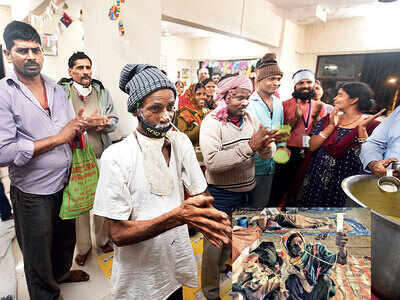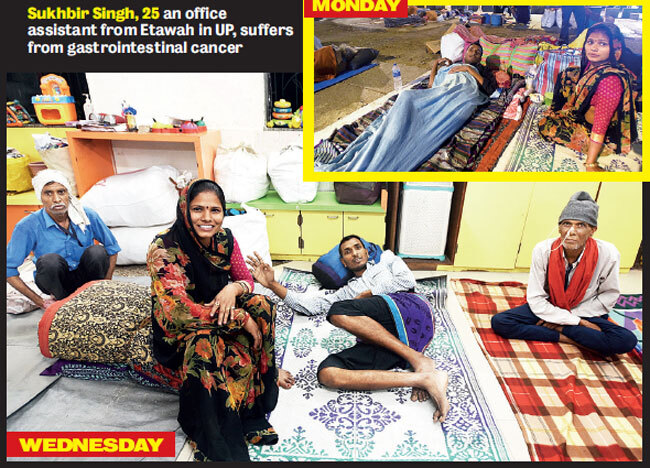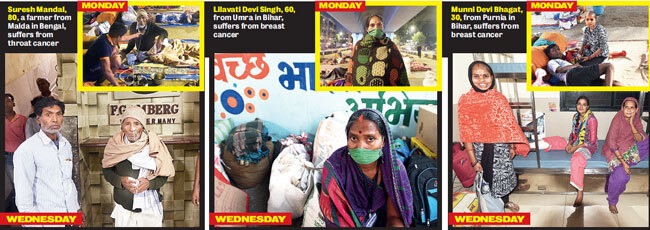Tata Memorial patients staying under flyover shifted to dharamshalas, get access to clean dormitories, free meals

Ramjatan Tani, 51, a resident of Bhagalpur village in Uttar Pradesh’s Deoria district, was operated on for oral cancer in October last year. He broke into a small dance, his son said, when he was brought to the Sant Gadge Maharaj dharamshala
CHEER! Assistant Municipal Commissioner Sangita Hasnale said the drive to move Tata Memorial Hospital patients to safe and hygienic spaces will continue
TheBMC on Wednesday moved all the Tata Memorial Hospital patients, who had made the space under the Hindmata flyover their temporary home in absence of affordable accommodations, to two dharamshalas – one in Dadar and the other attached to KEM hospital in Parel. The hundred-odd patients, most of whom had undergone life-saving surgeries infections as they were constantly exposed to dust and smoke under the flyover. They are now not only sharing clean dormitories and washrooms, but also have access to free meals .

The BMC moved the patients just hours after Mumbai Mirror front-paged a report on their plight in its Wednesday’s edition. Apart from spurring the municipal corporation into action, the report also moved Mumbaikars who began arriving at the Hindmata flyover from early in the morning with food, clothes, bedsheets, and blankets.
This newspaper also received numerous offers of financial help for the patients. The paper has put all these kind souls in touch with the Tata Memorial Hospital and charitable organisations involved in caring for cancer patients in the city.
Apart from the two dharamshalas – Visava attached to KEM hospital andSant Gadge Maharaj Mission Dharamshala in Dadar, Shri Guru Singh Sabha gurudwara in Chembur has informed the BMC that it can accommodate 16 patients. As more organisations come forward, chances are patients from pavements outside Tata Memorial may too land proper accommodation.

Ramjatani Tani, 51, whose picture consuming milk on Tuesday night with a nasal feed tube as vehicles rumbled past on both sides of the flyover led to anguished calls for help, broke into a little dance when he arrived at the Sant Gadge Maharaj Mission Dharamshala in Dadar. His son Rajesh, 18, who dropped out of college to bring his father from Bhagalpur village in Uttar Pradesh’s Deoria district to Mumbai for treatment, said the two would have a good night’s sleep after a long time. “It was impossible to get any sleep under the flyover due to the constant noise of traffic,” he said.
Sukhbir Singh, a resident of Etawah in Uttar Pradesh, who was operated for gastrointestinal cancer on December 26, said he had begun to think he would end up dead under the flyover. “Every day was a struggle for me. Exposed to dust and petrol and diesel fumes, I took ill twice. Now there is a new hope,” he said. Staying facilities for Tata Memorial cancer patients, who have to be in the city for long durations for follow-ups, has been a long-standing problem. Though the hospital runs a highly effective programme to offer patients and their care-takers place to stay at highly subsidised rates, the sheer numbers that the hospital handles overwhelm all efforts. One of the largest cancer treatment institutes in the country, Tata Memorial gets 65,000 new cancer patients every year and another 4,50,000 for follow-ups. With its untiring efforts, the hospital has been able to ensure that none of the children treated here have to stay on the streets during the post-operative care period.
India saw 14.5 lakh new cases of cancer and 7,36,000 deaths in 2016. These numbers are expected to increase to 17.3 lakh in 2030 with 8,80,000 deaths by 2020, according to the data from the National Cancer Registry Programme of the Indian Council of Medical Research.
Assistant Municipal Commissioner Dr Sangita Hasnale, who looks after the community development, said the drive to move Tata Memorial Hospital patient to safe and hygienic accommodations will continue.
Prashant Deshmukh, manager, Sant Gadge Maharaj Mission Dharamshala, was personally involved in ferrying the patients from under the flyover to the dharamshala. “It is true we often have long waiting lists. But today we managed to accommodate 40 patients who were staying under the Hindmata flyover,” he said.
Ninette D’Souza wrote: “Anyone visiting Tata Memorial Hospital will know [how bad the situation there is]. There is a place a little further down the road for patients to recuperate, but it falls woefully short, and new patients are always flocking to the hospital. How much can the Tatas do, or for that matter benevolent Mumbaikars? Each state should build a shelter to cater to its people. If they cannot build cancer hospitals this is the least they can do. The central government should also allocate funds through the Ministry of Health.”
Prem K Menon wrote: “Your cover story made for a sad read. It is a tragedy that cancer patients have to take shelter beneath a flyover. Thousands of vehicles pass by the area every day. The polluted environment will further aggravate the condition of the patients, whose immune system has already been compromised by chemo and drugs. Instead of malls and multiplexes, what we need is space for needy people. Since demand currently outstrips supply, the government should tap some sources of open land to help these people. NGOs and industrialists could also extend a helping hand.”
♦ RM Deshpande wrote: “This is a very difficult situation – for patients as well as their families and caretakers. Several non-government organisations and charitable trusts are already involved in providing care for patients around the city, but it seems that is not enough. The BMC, in collaboration with the Tata administration, should work out an arrangement to help the poorest of the poor who come all the way from distant places.”
♦ Sidhartha Srivastava wrote: “Mumbai Mirror deserves kudos for reporting this important story. It raises a number of questions. There is shortage of budget accommodation in the city. Can the BMC come out with a strategy to cover the area below the flyover and offer dormitory accommodation? NGOs and trusts should also come forward to help these people. However, the wider question is how state governments can build cancer centres for people in their state so they don’t have to travel all the way to Mumbai for treatment.”
♦ KP Rajan wrote: “The way cancer patients and their kin live on the streets of Mumbai reminds me of the hundreds of thousands of Rohingya refugees in Cox’s Bazar, Bangladesh. I salute the charitable organisations and various NGOs providing shelters to patients at affordable charges. However, the abysmally poor healthcare options in north India are a cause for concern. Before aiming for a $5 trillion economy, I feel the government should mitigate the sufferings of the people first.”
♦ Abhijith Radhakrishnan wrote: “It is very painful to see people living in such conditions because of lack of accommodation. If such is the condition in one of the largest cancer treatment centres in the country, imagine conditions at small hospitals. Our government spends crores of rupees on unimportant things like statues, but when it comes to important things it is found wanting. This is a serious case of negligence on the part of the government. The conditions under the flyover pose a further threat to the health of the patients. Proper accommodation should be provided and care should be taken to ensure that these patient are taken care of till they fully recover.”
♦ Maya Hemant Bhatkar wrote: “Tata Memorial Hospital cannot take responsibility for these patients as there is long waiting list of people waiting for operations. For many patients aftercare is a luxury. If you take a round of Parel area you will see patients on footpaths because hospitals can’t keep them for more time than needed. The BMC and state government need to work on this problem and build affordable sanatoriums for these patients.”
♦ S Nagaratnam wrote: “The news that a large number of poor cancer patients are living under a flyover is appalling. The unhealthy surroundings will make their situation worse. A charitable trust should come forward with an idea to build one-room tenements for these patients. These tenements need not be large – just around 200 square feet or so. The state can partly finance this scheme.”
♦ Dr Archana Rath wrote: “Your article highlighting the plight of cancer patients is heart-wrenching to say the least. I hope some solution is found quickly to help shelter such needy people. I would be glad to be of any assistance in this regard if required.”
The

WEDNESDAY
The BMC moved the patients just hours after Mumbai Mirror front-paged a report on their plight in its Wednesday’s edition. Apart from spurring the municipal corporation into action, the report also moved Mumbaikars who began arriving at the Hindmata flyover from early in the morning with food, clothes, bedsheets, and blankets.
This newspaper also received numerous offers of financial help for the patients. The paper has put all these kind souls in touch with the Tata Memorial Hospital and charitable organisations involved in caring for cancer patients in the city.
Apart from the two dharamshalas – Visava attached to KEM hospital and

WEDNESDAY
Ramjatani Tani, 51, whose picture consuming milk on Tuesday night with a nasal feed tube as vehicles rumbled past on both sides of the flyover led to anguished calls for help, broke into a little dance when he arrived at the Sant Gadge Maharaj Mission Dharamshala in Dadar. His son Rajesh, 18, who dropped out of college to bring his father from Bhagalpur village in Uttar Pradesh’s Deoria district to Mumbai for treatment, said the two would have a good night’s sleep after a long time. “It was impossible to get any sleep under the flyover due to the constant noise of traffic,” he said.
Sukhbir Singh, a resident of Etawah in Uttar Pradesh, who was operated for gastrointestinal cancer on December 26, said he had begun to think he would end up dead under the flyover. “Every day was a struggle for me. Exposed to dust and petrol and diesel fumes, I took ill twice. Now there is a new hope,” he said. Staying facilities for Tata Memorial cancer patients, who have to be in the city for long durations for follow-ups, has been a long-standing problem. Though the hospital runs a highly effective programme to offer patients and their care-takers place to stay at highly subsidised rates, the sheer numbers that the hospital handles overwhelm all efforts. One of the largest cancer treatment institutes in the country, Tata Memorial gets 65,000 new cancer patients every year and another 4,50,000 for follow-ups. With its untiring efforts, the hospital has been able to ensure that none of the children treated here have to stay on the streets during the post-operative care period.
India saw 14.5 lakh new cases of cancer and 7,36,000 deaths in 2016. These numbers are expected to increase to 17.3 lakh in 2030 with 8,80,000 deaths by 2020, according to the data from the National Cancer Registry Programme of the Indian Council of Medical Research.
Assistant Municipal Commissioner Dr Sangita Hasnale, who looks after the community development, said the drive to move Tata Memorial Hospital patient to safe and hygienic accommodations will continue.
Prashant Deshmukh, manager, Sant Gadge Maharaj Mission Dharamshala, was personally involved in ferrying the patients from under the flyover to the dharamshala. “It is true we often have long waiting lists. But today we managed to accommodate 40 patients who were staying under the Hindmata flyover,” he said.
Ninette D’Souza wrote: “Anyone visiting Tata Memorial Hospital will know [how bad the situation there is]. There is a place a little further down the road for patients to recuperate, but it falls woefully short, and new patients are always flocking to the hospital. How much can the Tatas do, or for that matter benevolent Mumbaikars? Each state should build a shelter to cater to its people. If they cannot build cancer hospitals this is the least they can do. The central government should also allocate funds through the Ministry of Health.”
Prem K Menon wrote: “Your cover story made for a sad read. It is a tragedy that cancer patients have to take shelter beneath a flyover. Thousands of vehicles pass by the area every day. The polluted environment will further aggravate the condition of the patients, whose immune system has already been compromised by chemo and drugs. Instead of malls and multiplexes, what we need is space for needy people. Since demand currently outstrips supply, the government should tap some sources of open land to help these people. NGOs and industrialists could also extend a helping hand.”
♦ RM Deshpande wrote: “This is a very difficult situation – for patients as well as their families and caretakers. Several non-government organisations and charitable trusts are already involved in providing care for patients around the city, but it seems that is not enough. The BMC, in collaboration with the Tata administration, should work out an arrangement to help the poorest of the poor who come all the way from distant places.”
♦ Sidhartha Srivastava wrote: “Mumbai Mirror deserves kudos for reporting this important story. It raises a number of questions. There is shortage of budget accommodation in the city. Can the BMC come out with a strategy to cover the area below the flyover and offer dormitory accommodation? NGOs and trusts should also come forward to help these people. However, the wider question is how state governments can build cancer centres for people in their state so they don’t have to travel all the way to Mumbai for treatment.”
♦ KP Rajan wrote: “The way cancer patients and their kin live on the streets of Mumbai reminds me of the hundreds of thousands of Rohingya refugees in Cox’s Bazar, Bangladesh. I salute the charitable organisations and various NGOs providing shelters to patients at affordable charges. However, the abysmally poor healthcare options in north India are a cause for concern. Before aiming for a $5 trillion economy, I feel the government should mitigate the sufferings of the people first.”
♦ Abhijith Radhakrishnan wrote: “It is very painful to see people living in such conditions because of lack of accommodation. If such is the condition in one of the largest cancer treatment centres in the country, imagine conditions at small hospitals. Our government spends crores of rupees on unimportant things like statues, but when it comes to important things it is found wanting. This is a serious case of negligence on the part of the government. The conditions under the flyover pose a further threat to the health of the patients. Proper accommodation should be provided and care should be taken to ensure that these patient are taken care of till they fully recover.”
♦ Maya Hemant Bhatkar wrote: “Tata Memorial Hospital cannot take responsibility for these patients as there is long waiting list of people waiting for operations. For many patients aftercare is a luxury. If you take a round of Parel area you will see patients on footpaths because hospitals can’t keep them for more time than needed. The BMC and state government need to work on this problem and build affordable sanatoriums for these patients.”
♦ S Nagaratnam wrote: “The news that a large number of poor cancer patients are living under a flyover is appalling. The unhealthy surroundings will make their situation worse. A charitable trust should come forward with an idea to build one-room tenements for these patients. These tenements need not be large – just around 200 square feet or so. The state can partly finance this scheme.”
♦ Dr Archana Rath wrote: “Your article highlighting the plight of cancer patients is heart-wrenching to say the least. I hope some solution is found quickly to help shelter such needy people. I would be glad to be of any assistance in this regard if required.”
GALLERIES View more photos

















